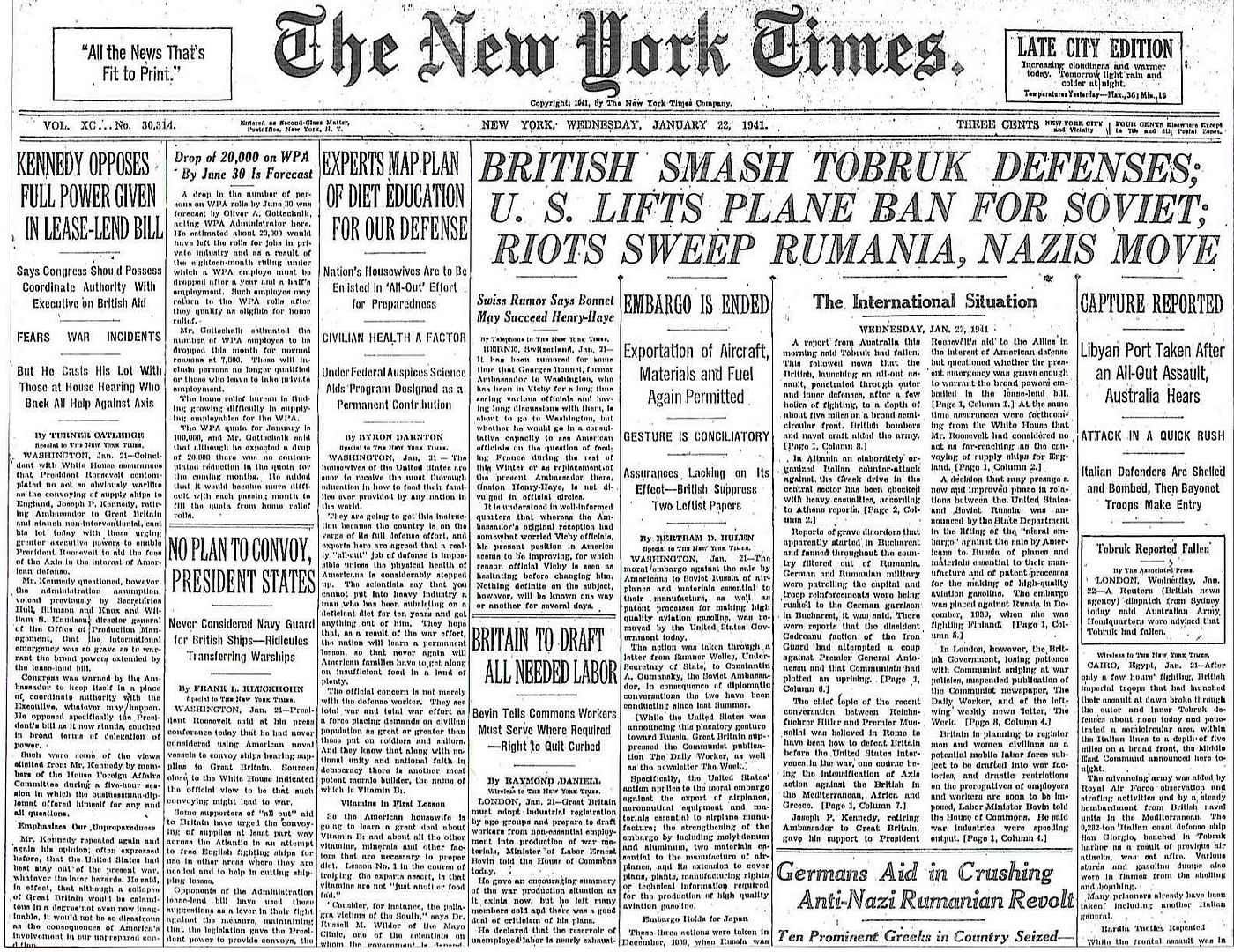
Posted on 01/22/2011 4:50:22 AM PST by Homer_J_Simpson

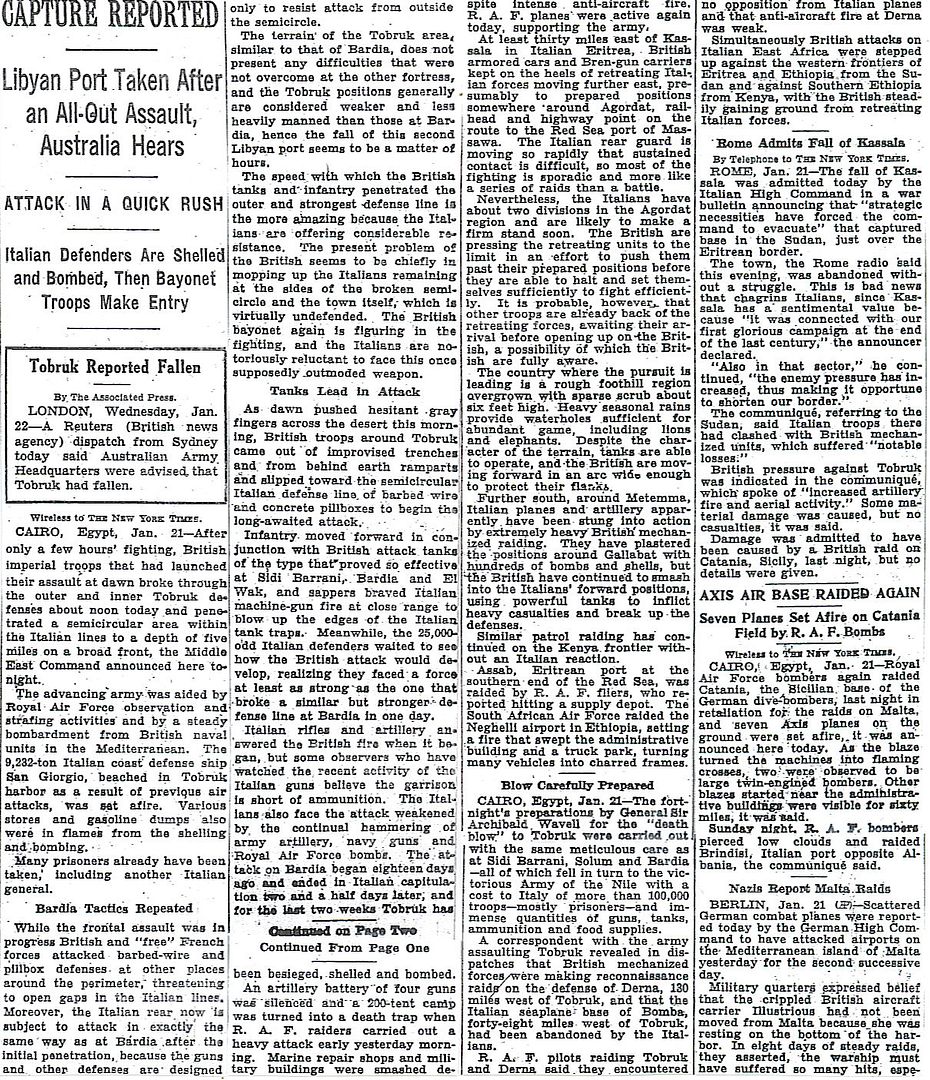
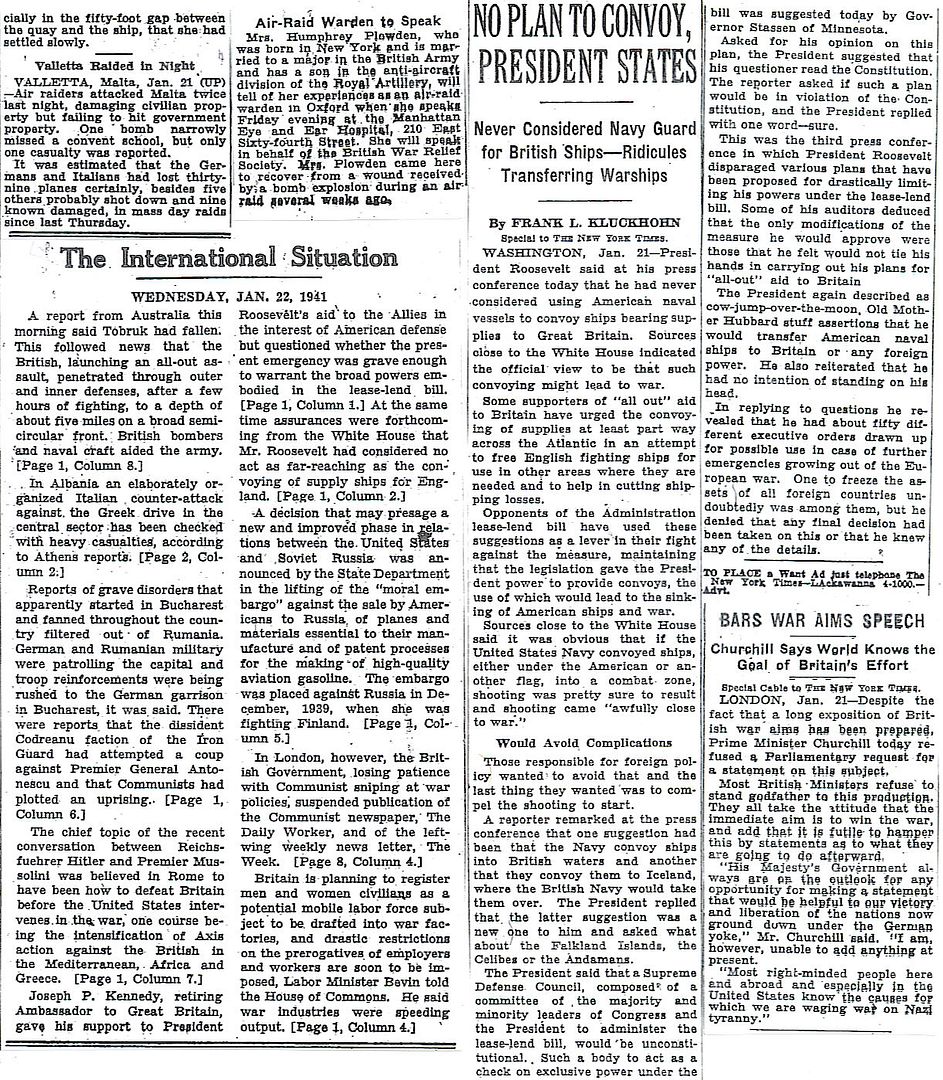
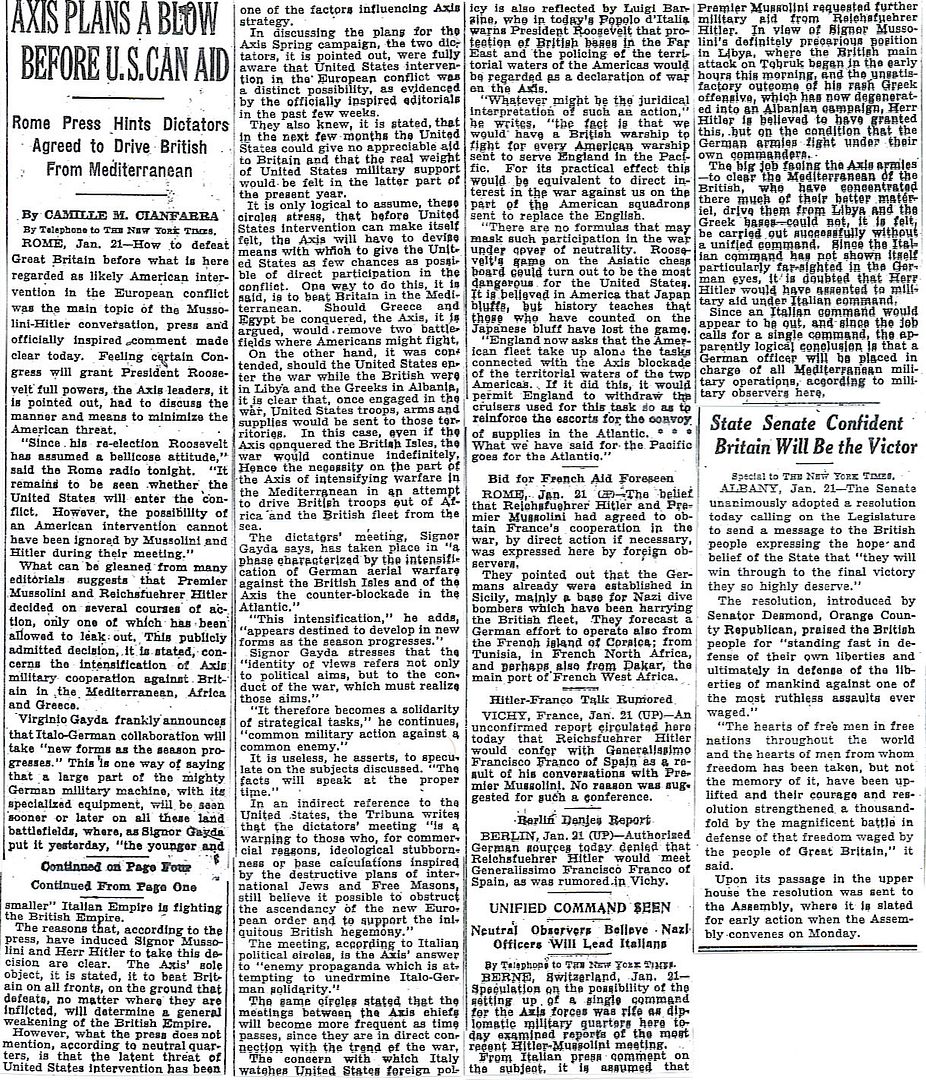
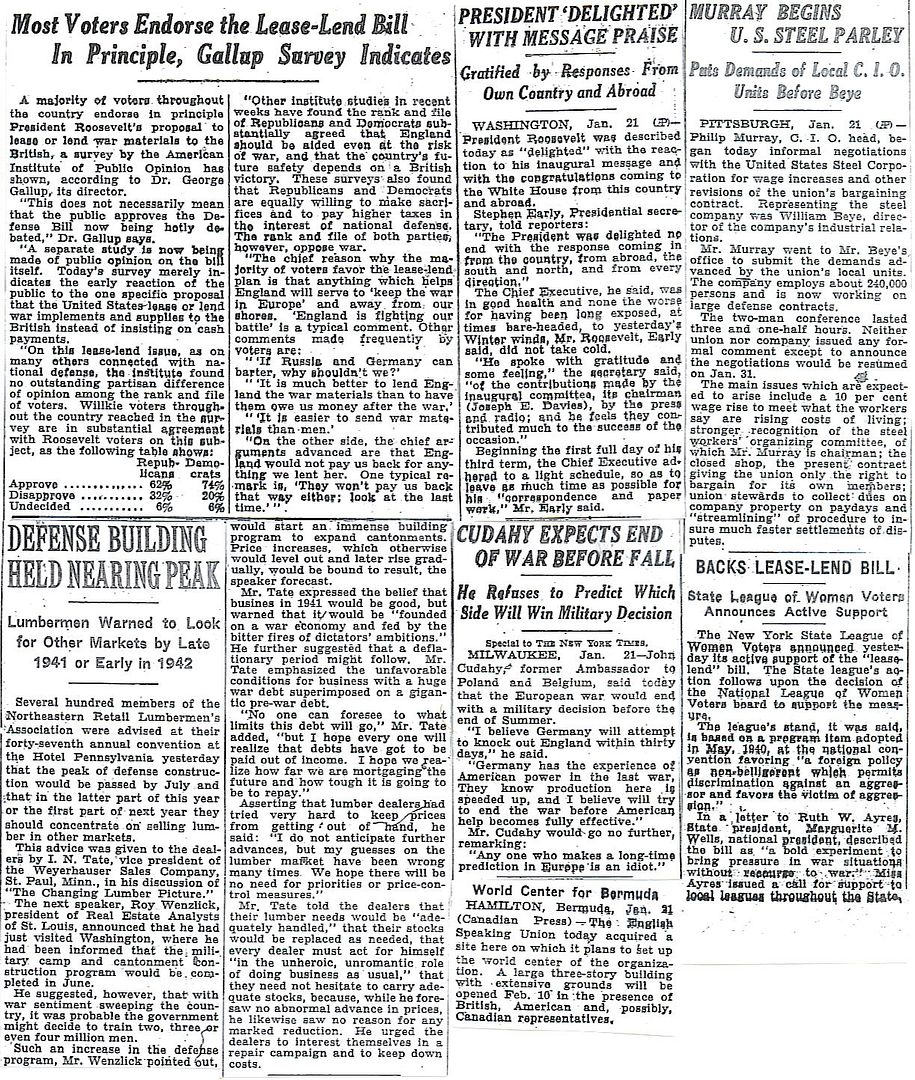
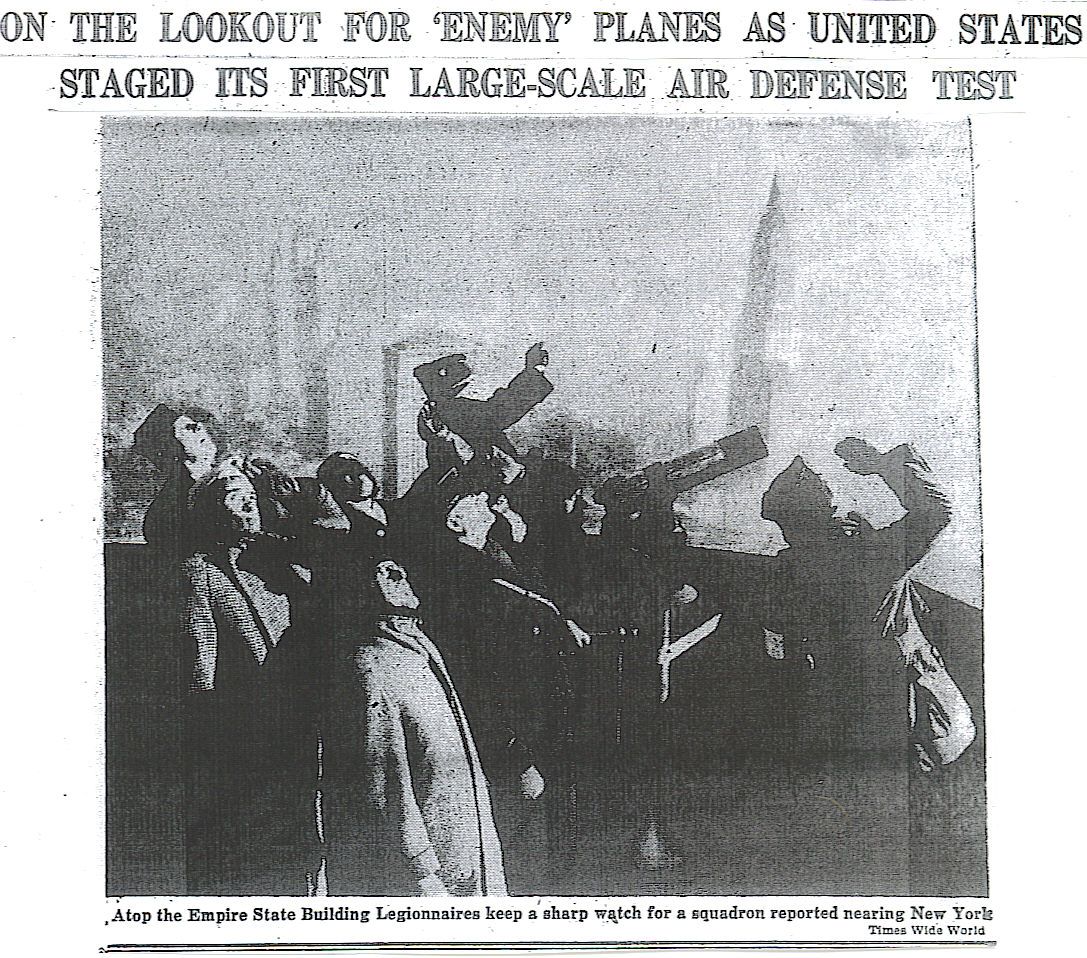
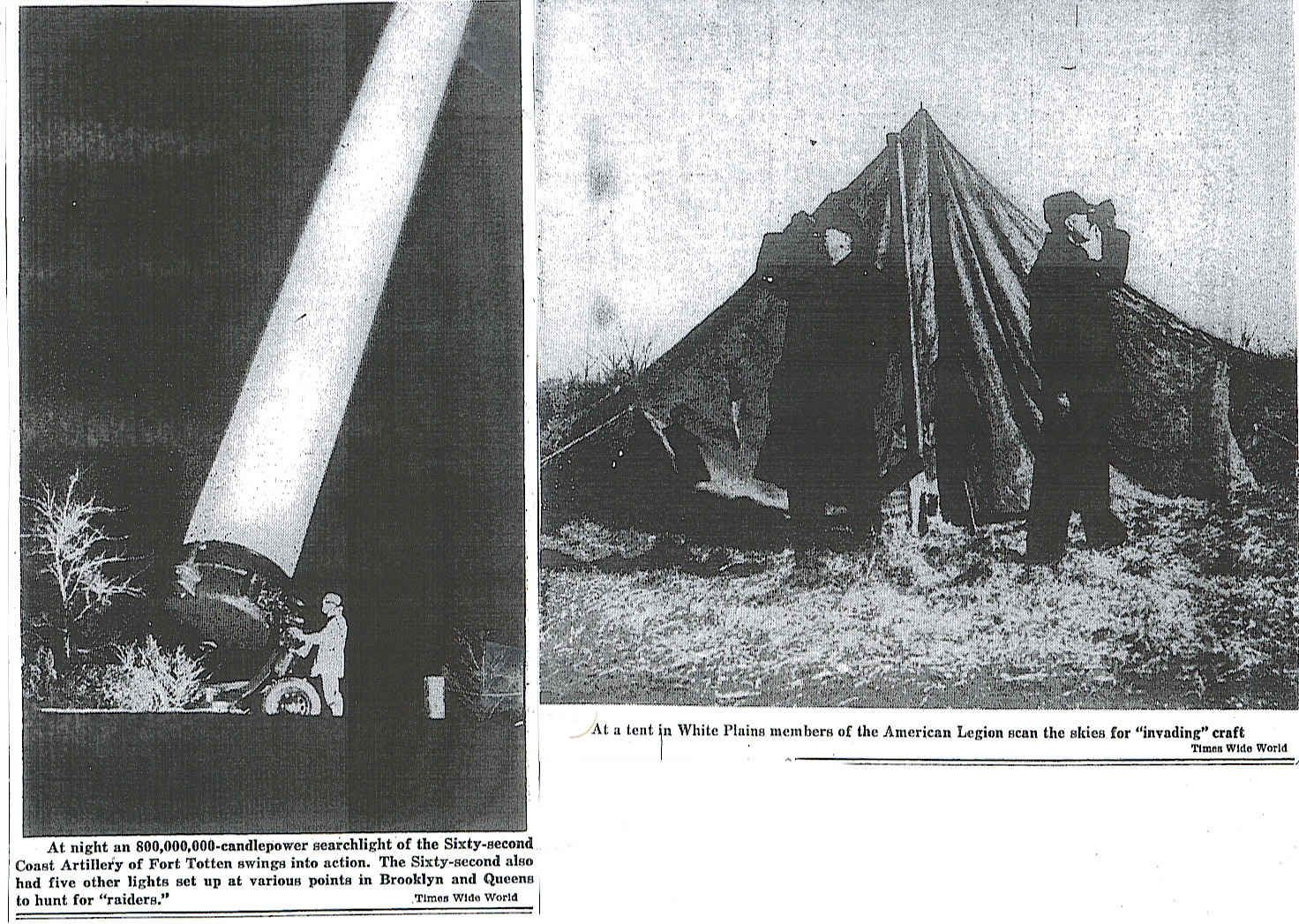
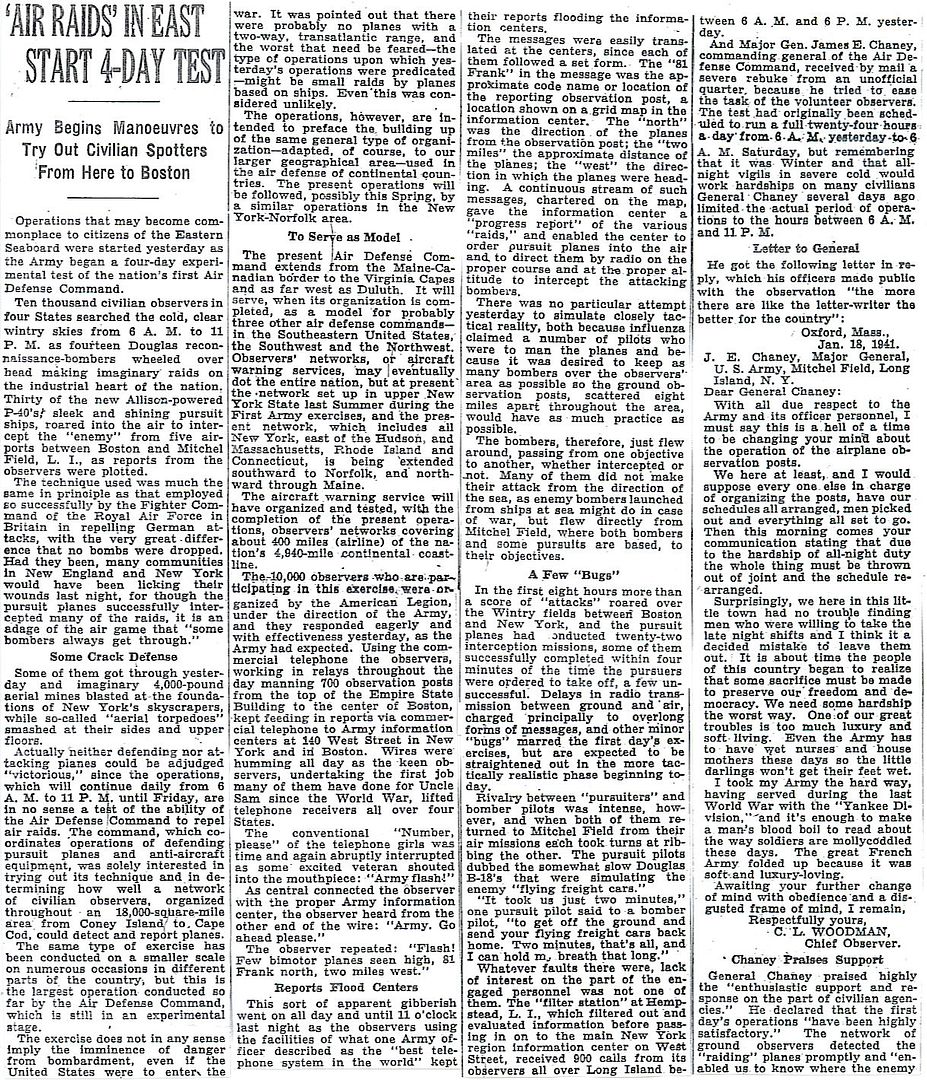
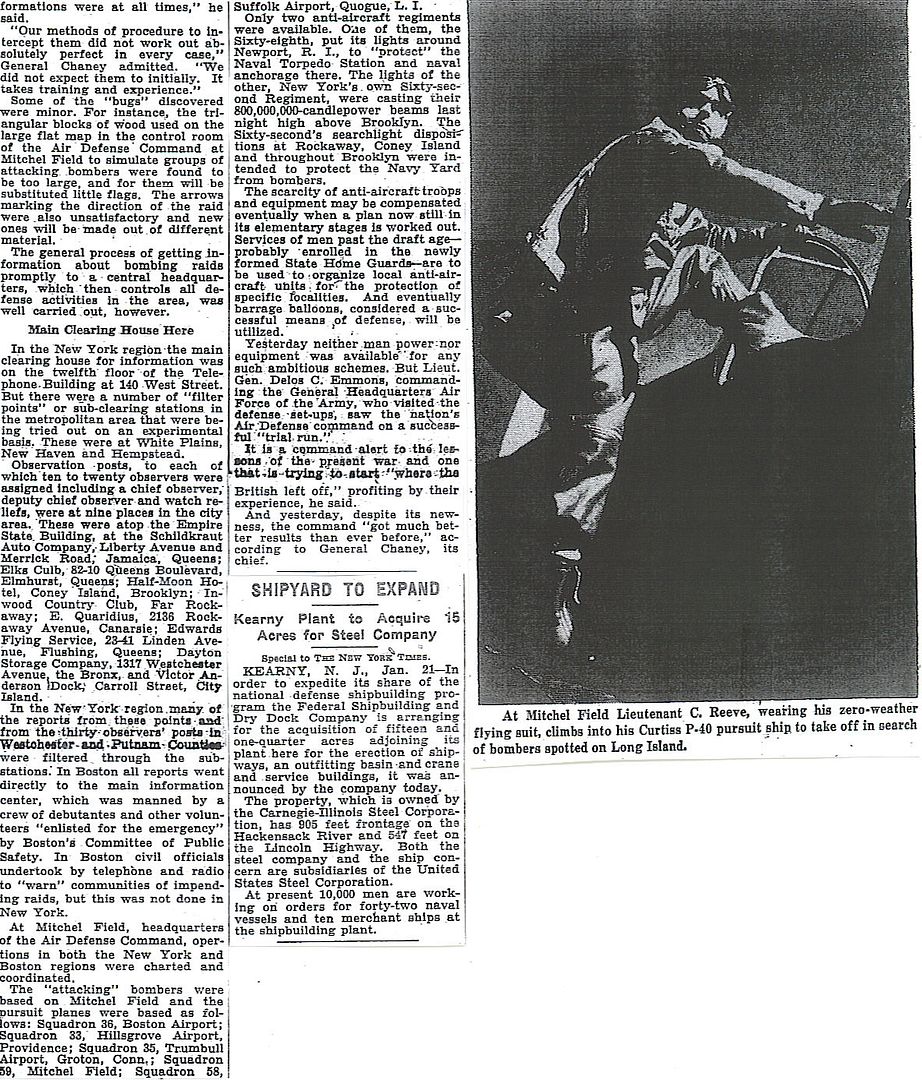
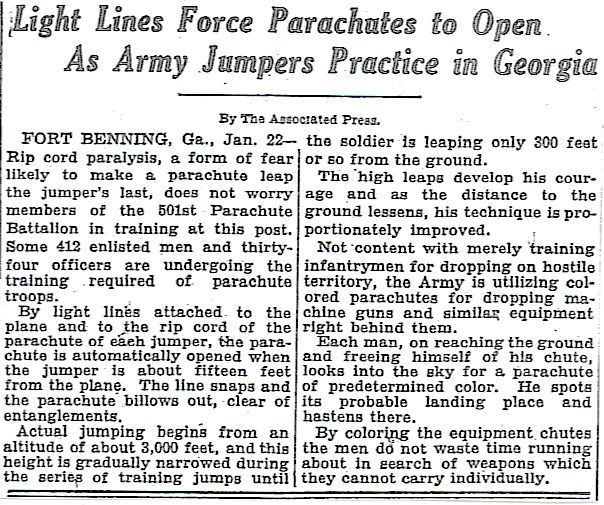
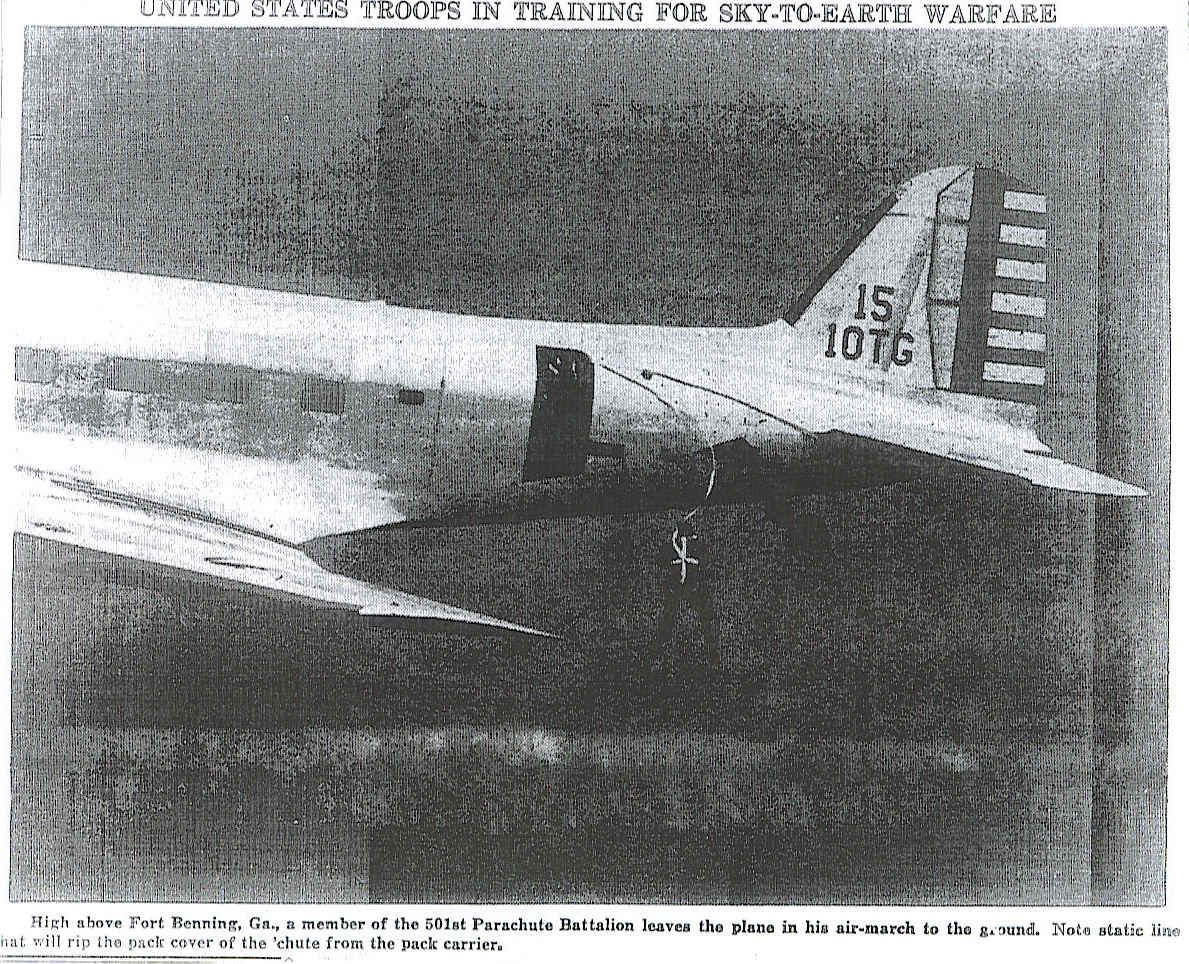
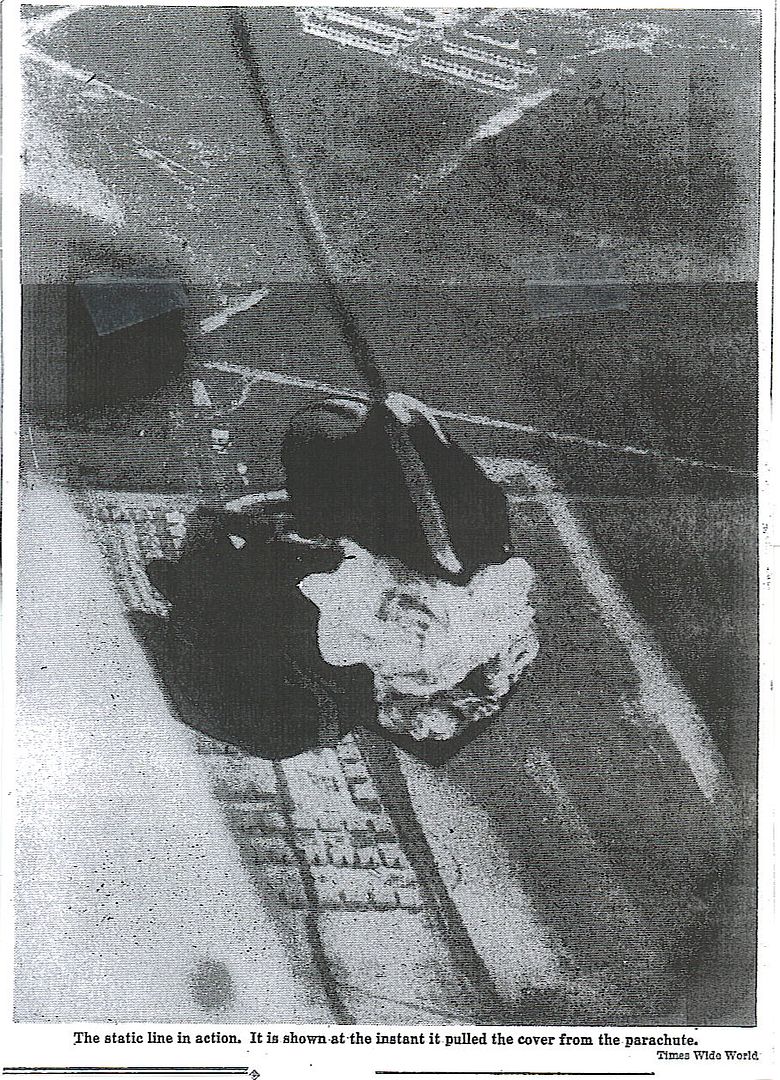
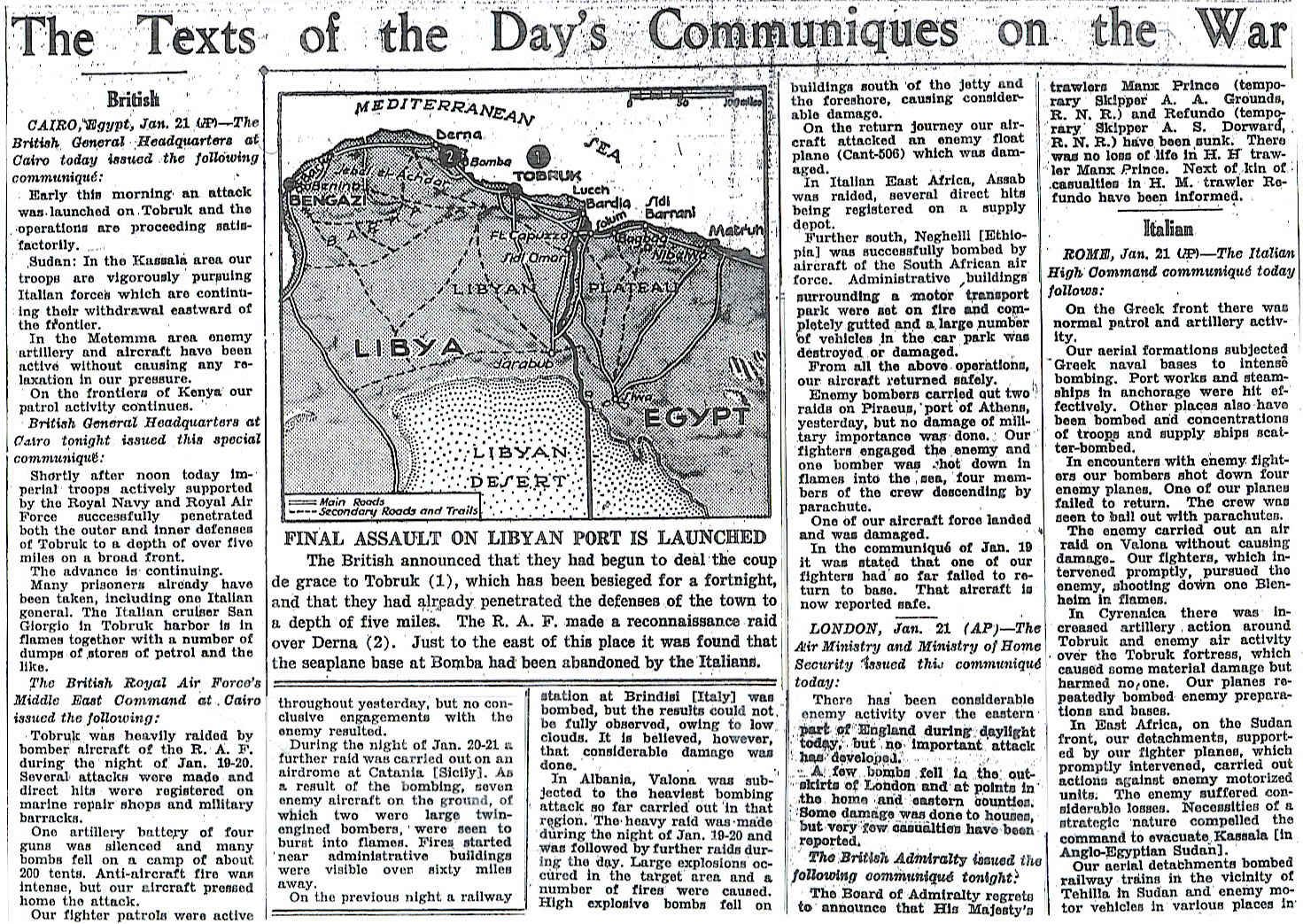
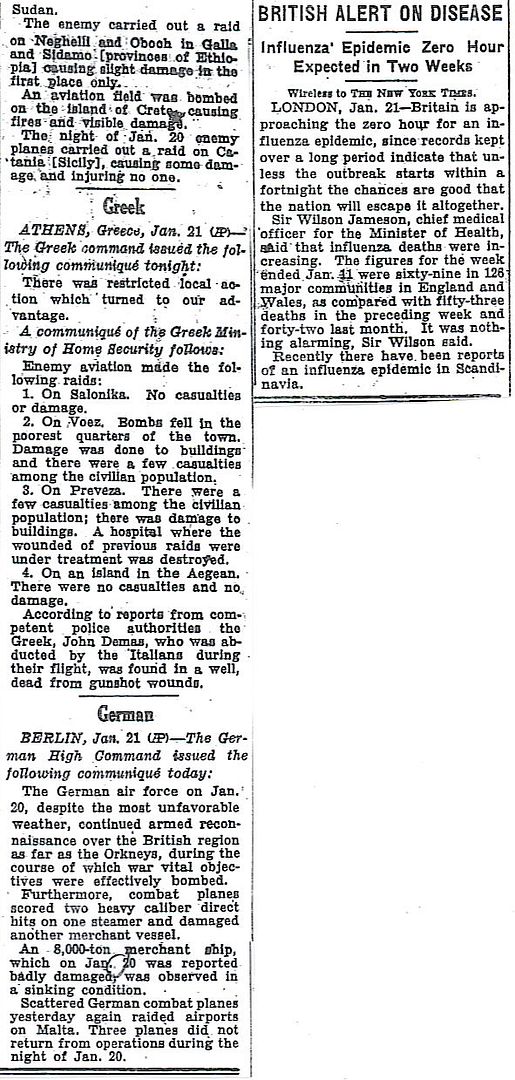
http://www.onwar.com/chrono/1941/jan41/f22jan41.htm
British capture Tobruk
Wednesday, January 22, 1941 www.onwar.com
In North Africa... The remainder of the garrison of Tobruk surrenders after demolishing some of the harbor facilities. There are 27,000 prisoners. Much equipment is also captured and in fact it will prove possible to put the port into service fairly quickly. The Allied casualties have been less than 500 men.
In East Africa... In Eritrea the Italian forces are falling back toward Agordat in the face of Platt’s attacks. There is also some skirmishing along the border between Kenya and Italian Somaliland.
http://homepage.ntlworld.com/andrew.etherington/month/thismonth/22.htm
January 22nd, 1941
UNITED KINGDOM: Minesweeping trawler HMS Luda Lady mined and sunk off the Humber.
Rescue tug HMS St Cyrus mined and sunk off the Humber. (Dave Shirlaw)
GERMANY: U-67 commissioned. (Dave Shirlaw)
POLAND: Lublin: Governor Hans Frank tells a meeting of Nazi officials: “We who for 20 years have been fighting beside the Fuhrer cannot be asked to have any consideration left for the Jews.”
YUGOSLAVIA: Belgrade: It is reported that south-eastern Europe, already forced to eat stale black bread and pay exorbitant prices for essential foodstuffs, is now facing new shortages, because so many railway lines have been commandeered for Nazi troop movements and Italian and German shipments of war materials. There is rioting over food regulations in Yugoslavia and Romania.
NORTH AFRICA: Tobruk falls to O’Connor along with 30,000 prisoners.
Tobruk: For the past few days the main enemy has been a fierce sandstorm, clogging air-intakes on aircraft, tanks and guns breeches and filling the eyes, ears, mouths and noses of men seeking shelter from its blast. But for the past two days the Italian defenders have also had to endure a bombardment of thousands of tons of HE hurled into Tobruk. The barrage has matched the intensity of that at Ypres in 1917 and stopped only this dawn. Australian sappers went forward to cut the barbed wire on the outer perimeter and clear the way for the infantry who had moved to within 1,000 yards of the Italian trenches during the night. Backed by British armour, the Australians faced stiff resistance at first with many Italians dying at their guns. But eventually the resistance faded and white flags were seen above the defending trenches.
With the outer ring of defences breached the tanks could attack the defenders from the rear. Of the three forts within the town, the first was taken by the infantry after fierce hand-to-hand fighting, the other two surrendered quickly afterwards. With the forts taken the town surrendered.
No Union flag could be found so an Australian “Digger’s” hat flies from the flagpole over Tobruk.
EGYPT: Wavell in a telegram to the War Office relays Lt. Gen. Alan Cunningham’s request for more equipment for the East African theatre rather than more men. He believes that small forces, well equipped can achieve greater results.
ERITREA: The Italian forces are falling back toward Agordat in the face of General William Platt’s (Commander in Chief East Africa Command) attacks. There is also some skirmishing along the border between Kenya and Italian Somaliland. (Jack McKillop)
CANADA: Minesweeper HMCS Minas launched North Vancouver, British Columbia. (Dave Shirlaw)
U.S.A.: Hart informed Navy Department had decided not to accept Rainbow-3 and that the reinforcements set out in that plan would not be assigned to the Asiatic Fleet. (Marc Small)
The heavy cruiser USS Louisville (CA-28) arrives at New York City, with US$148,342,212.55 in British gold brought from Simonstown, South Africa, to be deposited in American banks. (Jack McKillop)
http://worldwar2daybyday.blogspot.com/
Day 510 January 22, 1941
Operation Compass. Italian resistance at Tobruk collapses. At 4.15 AM, cruiser San Giorgio (used as a floating battery in the harbour) is scuttled. General Vincenzo della Mura surrenders Italian 61 Infantry Division “Sirte” in the morning, precipitating a widespread capitulation. Allied troops capture the remaining gun posts with sporadic resistance. Monitor HMS Terror and gunboats Gnat and Ladybird continue shelling. Italian liner Liguria is sunk by British bombing. Australian infantry drive into the town unopposed and take the surrender of Tobruk from Admiral Massimilian Vietina. Australian losses are 49 dead, 306 wounded. In all, 25,000 Italian prisoners are captured along with 236 field guns and medium guns, 23 medium tanks and 200 other vehicles. Tobruk’s sheltered harbour is intact as are wells and pumps to produce 40,000 gallons of fresh (if brackish) water per day.
Eritrea, East Africa. 4th Indian Division attacks Italian position at Keru, which were flanked yesterday by 5th Indian Division. The Italians at Keru, who were expected to hold out for several weeks, surrender (General Fongoli, his staff, 1200 men and several field guns are captured).
Minesweeping trawler HMT Luda Lady sinks on a mine in the Humber (no casualties).
Operation Berlin. German pocket battleships Scharnhorst and Gneisenau sail from Kiel in a second attempt to break out into the Atlantic for convoy raiding operations.
SCHARNHORST and GNIESENAU were originally classified as battlecruisers, not pocket battleships. Despite a main armament of nine 11” guns, they were subsequently reclassified as battleships. SCHARNHORST was arguably the most successful warship in the German fleet.
There were three pocket battleships: The ADMIRAL GRAF SPEE, the ADMIRAL SCHEER, and the LUETZOW nee DEUTSCHLAND. They were originally classified as Panzerschiffes, subsequently as cruisers. ADMIRAL SCHEER was the most successful of the three.
I assume the Admiral commanding this breakout is Guenther Lutjens?
"Scharnhorst's first wartime operation was a sortie into the Iceland-Faroes passage, which lasted six days from 21-27 November 1939, with Gneisenau in which she sank the British Armed Merchant Cruiser HMS Rawalpindi, although her victim fought a tough defensive battle.
The Rawalpindi's Captain, Edward Coverley Kennedy (father of naval Historian Ludovic Kennedy[9]), had been notified at around 15:30 hrs that a large warship had been sighted. Kennedy identified it as the Deutschland. Sighting another large ship, Kennedy thought it was a British Heavy Cruiser, and hoped it would be Rawalpindi's savior. He therefore ignored the warning shots fired by Scharnhorst. Unfortunately the ship sighted was Gneisenau, and Kennedy found himself surrounded.
The ensuing battle lasted just 15 minutes. Scharnhorst eventually sank the ship, killing 238 of the crew, including Kennedy. The German squadron stopped to rescue 38 survivors from the freezing seas. The German commanders on both Gneisenau and Scharnhorst commented on the bravery of the Captain and his crew."
Nice view of the rigging for the torpedo nets. The US might have considered them useless by that point, but it looks like the Germans were still using them in 1939.
I disagree with the year on number 7. Italy invaded Ethiopia in 1935, they did not conquer it until 1936. I did about the same as I usually do. The Belfast one had me kicking myself. I assumed since Berehaven is not physically on the coast of Eire that it was the answer and totally read over Belfast, North Ireland. I almost guessed Landon for my third on 13. I should have.
Ooh, Tobruk! Michael Palin, during his “Sahara” series, met a group of Tobruk veterans on a “last visit before we die.” It was very touching.
Note that both Republicans and Democrats strongly support Roosevelt's current efforts -- Dems slightly more than Republicans.
Note also some of the logic: helping Britain will keep the war in Europe and away from our shores.
If these points seem simple and obvious to you, you might note how they sometimes get distorted in support of some political agenda or other.
So what happened to all those patriotic Democrats?
I'm guessing a lot of the old Roosevelt Democrats eventually became Reagan Democrats and are now more-or-less Republicans.
Those from the South are Conservatives, those from the North are often, well, more moderate.
Disclaimer: Opinions posted on Free Republic are those of the individual posters and do not necessarily represent the opinion of Free Republic or its management. All materials posted herein are protected by copyright law and the exemption for fair use of copyrighted works.